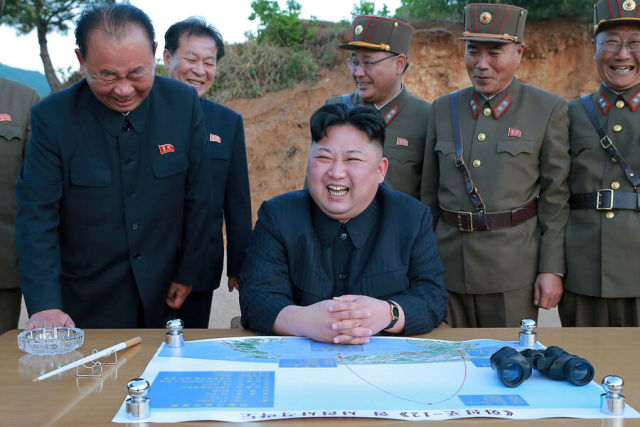The DPRK has declared itself a nuclear state at the legislative level Pyongyang, which has repeatedly tested nuclear weapons, has officially declared its existence.
The Supreme People's Assembly of North Korea adopted a decree entitled "Nuclear Weapons Policy", according to which the DPRK will respond with a nuclear strike in the event of an attack on it using similar weapons. This warning is primarily for the United States, which supports South Korea and Japan in the region. "Newspaper.Ru" dealt with experts, what is the real nuclear potential of the DPRK.
North Korea has officially declared itself a nuclear state at the legislative level, the Korean Central Telegraph Agency (KCNA) reported. The fact that the DPRK has nuclear weapons was known earlier, now it has been confirmed at the state level.
Pyongyang thus joined the world club of "Nuclear states". It includes the United States, Russia (as the successor of the Soviet Union), Great Britain, France, China, as well as India and Pakistan, which conducted nuclear tests. Israel hides the presence of nuclear weapons, adhering to a "policy of deliberate ambiguity," while its arsenal is estimated at about 400 nuclear warheads. The DPRK also does not disclose the exact number of nuclear weapons, but declares the possibility of hitting the territory of the United States.
"The peculiarity of the Nuclear Club is that membership in it does not require any recommendations from members already in the club," he told the newspaper.Ru" political scientist Alexander Zimovsky. - It is only necessary to meet the following criteria: independently make atomic bombs and independently make working means of delivering bombs to their destination. The DPRK did not reach this level yesterday. Now it has given its nuclear forces a domestic/international legal status."
A year ago, Kim Jong-un formulated a number of key strategic goals of North Korea's nuclear weapons program. They include the creation of both super-powerful and tactical nuclear weapons, bringing the range of launch vehicles to 15 thousand kilometers and creating a platform for submarine-based nuclear weapons. Technologically, the DPRK has reached the level of nuclear production, which allows it to receive about 55 kilograms of weapons-grade plutonium annually. That is, about 10-12 atomic warheads, depending on the power of the ammunition. In general, the DPRK's membership in the nuclear club recorded by the turnout order can be considered a hefty slap from Comrade Kim Jong-un to both Washington and personally to Comrade Biden.
If Trump came close to the topic of denuclearization of the DPRK in his personal talks with Kim Jong-un, then the current US administration actually sponsored the emergence of a new nuclear player in the Asia-Pacific region, where the Americans tried their best to maintain their dominance as the largest nuclear power. But something went wrong."
The missile armament of the DPRK army is represented by a wide range of short- and medium-range ballistic tactical missiles capable of striking targets at a distance of 100 to the declared 4,000 kilometers. One of them, the Hwasong-11 single-stage solid-fuel rocket, is an analogue of the Tochka-U missile system, whose own production in North Korea was established in 2005. All other missiles are also based on the "Soviet component" - they were copied from either Russian or Chinese missiles.
"The potential of Korean nuclear missiles is not fully known, but the very fact of their presence and demonstration of launches can be considered an element of self-defense," he told the newspaper.Ru" military expert Vladislav Shurygin. - Pyongyang is thus trying to protect itself from external pressure, confirming its readiness to respond adequately to possible strikes and use existing nuclear weapons. It is likely that the DPRK was able to develop and obtain a ballistic missile with higher characteristics, with a range of more than 10 thousand kilometers. At the same time, North Korea's nuclear potential is noticeably lower than that of neighboring China and Russia. Such a "demonstration of muscles" is more like a warning about readiness to respond to an attempt of external aggression and detonate a bomb that can cause a chain reaction and lead to a general nuclear war. It is unlikely that Moscow and Beijing will support such a policy," the decree "Policy on nuclear weapons" lists 11 conditions for the use of nuclear weapons. Among them is an attack on the command and personally on the head of the DPRK, Kim Jong-un. However, attempts to attack units of the North Korean army may also lead to a nuclear response. "If the command and control system of the national nuclear forces is under threat of an attack by hostile forces, a nuclear strike will be automatically immediately launched to destroy the hostile forces, including the source of the provocation and its command, in accordance with a predetermined plan of operation," the Korean news agency quotes the plans of the military.
"North Korea has received nuclear weapons, which it has now announced, this is not the biggest news," he told the newspaper.En" military expert Boris Jerilievsky. - There is more of a question here, but how should Russia react to such a fact? You could say, "No way!", but you will have to react. By strengthening its own missile defense system in the region, which will not cover Korea, but our Far East, the Kuriles and Sakhalin. There is already an "umbrella" of S-400 systems there, it is possible that it will need to be expanded in Primorye. Again, we have the Vostochny cosmodrome in the Blagoveshchensk region there, which will also need additional protection."
Victor Sokirko

